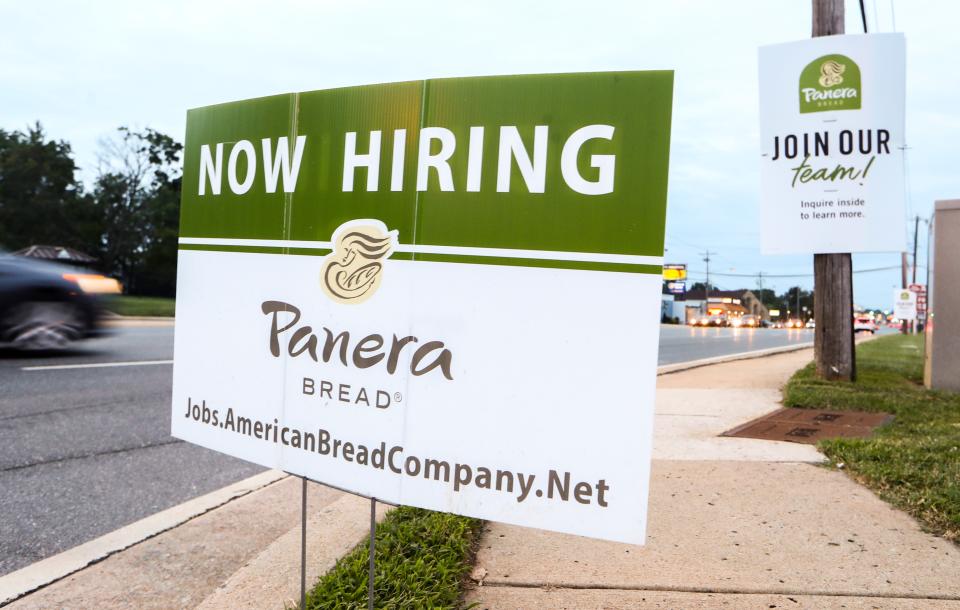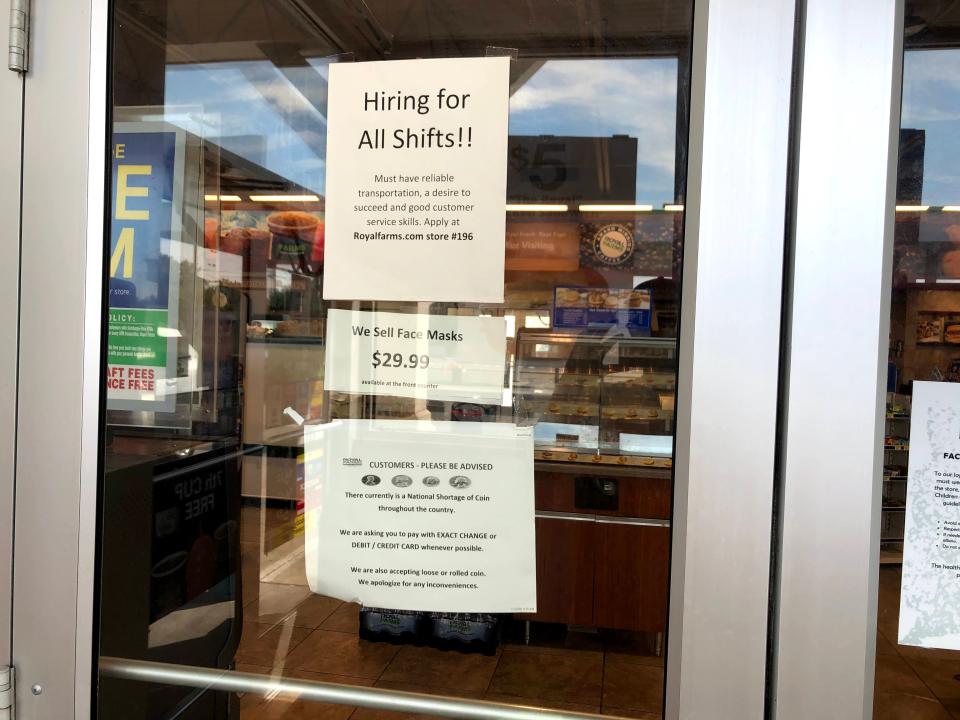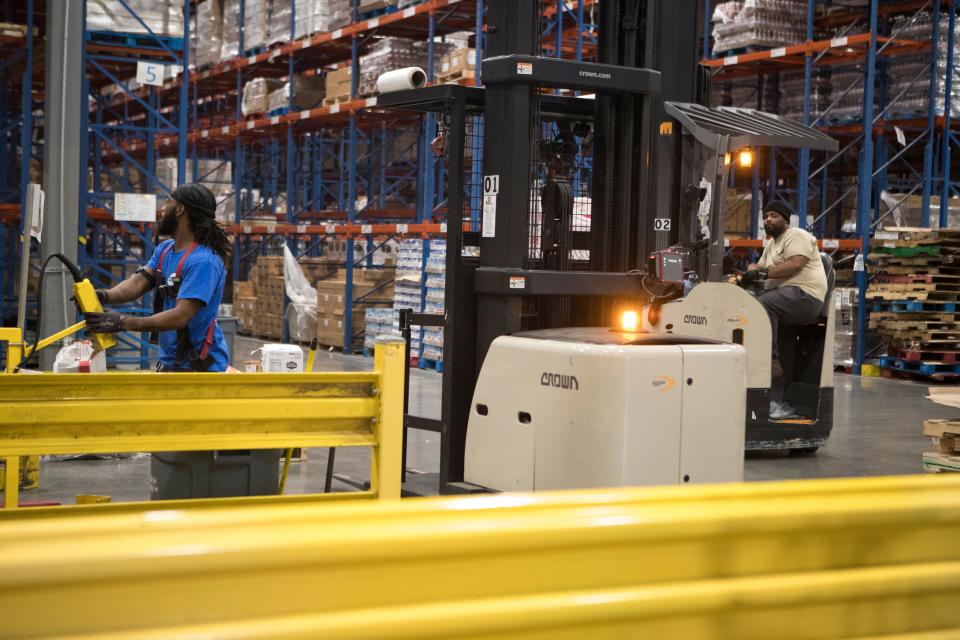Here's what Delaware employers see as their greatest barriers to hiring
Delaware employers expect the number of their open positions to grow over the next three years and cite "lack of experience" as the most common attribute deficient in job applicants.
Those were among the findings from a survey of 251 Delaware business decision-makers conducted by the Delaware Workforce Development Board and released late last month. Created by Gov. John Carney, the board is designed to prepare and connect workers with jobs, job training and other resources to secure financial independence.
The survey was the board's first step toward becoming more data driven, said Executive Director Joanna Staib. It faces a jobs landscape still rattled by the COVID-19 pandemic and the state's precautionary measures.
"We're no different than anywhere else," Staib said. "We've got more jobs than people."

Staib helped run her family's Newark Main Street shop, Grassroots, for 25 years before working in the New Castle County Chamber of Commerce and as a job training provider at a nonprofit. She joined the workforce development board last year.
The survey results, she said, emphasize the need for businesses of all sizes to compete for job seekers.
Two-thirds of the business decision-makers surveyed represent small businesses with 100 or fewer workers. Their survey responses were broken down by sector. Nineteen sectors were represented from construction to education.
Here are five takeaways from the survey results.
TOP EMPLOYERS: Delaware's top 10 largest employers. See who made the list and who fell off.
1. There are jobs available
Jobs are open almost across the board with the greatest current need in the manufacturing, health care and retail trade industries.
Leaders from almost every industry expect their number of open positions to increase in the next three years. A significant driver of that increase is the number of jobs expected to be lost due to retirement.
Nearly a third of surveyed decision-makers expect to lose two or more "mission-critical" positions to retirement in the next year, and half expect to lose two or more such positions in the next five years.
Where employees used to stay in organizations for four or five years before considering a change, Staib expects turnover to continue to speed up post-COVID.
"There's not as much of an internal issue if I jump to another job in a year or two," she said.

2. "Lack of experience" is the number one barrier to hiring
Two-in-five surveyed employers cited "lack of experience" as a barrier to hiring.
It was the most common response from decision-makers overall, with respondents in professional, scientific and technical services, "other services" and education and construction accounting for the most significant part of the tally.
Even more survey respondents said their staff members "don't have the time" to provide training. Management not having time and a lack of funding were the next most commonly cited barriers to providing training.
HIRING: With businesses struggling to hire, workers describe the unending hunt as 'emotionally draining'
3. Employers say non-technical skills are lacking among applicants
More than half of the employers surveyed said "self-motivation" is lacking among job applicants they see.
Communication skills, problem solving and critical thinking and attention to detail were other "soft skills" more than 40% of employers said are lacking among applicants.
Staib theorized that at least part of the perceived lack of soft skills can be attributed to a disconnect between the communication styles of the younger generations entering the workforce and older generations more likely to be in hiring roles. She is considering whether having someone in the middle in a mentor role could help bridge the gap.
WORK FROM HOME: Heading back to the office? See how 5 Delaware employers are reimagining the workplace.
"My gut is, I look at myself and I look at my kids — the way they communicate nowadays is completely different than how I communicate," Staib said. "Their communication is quick."
The survey revealed a fairly even split by industry. The soft skills were the same qualities cited as the most difficult to recruit for.
Respondents also said that technical skills are lacking. The skills applicants are most likely to lack are Microsoft Excel and Word, basic computer literacy, data analysis and online marketing, according to the survey results.

4. About 80% of employers say they have positions that do not require a college degree
Four-in-five employers surveyed said they have positions that do not require a college degree.
Among the top sectors in this category are warehousing and transportation where 100% of positions don't require a degree. It's one of Delaware's fastest-growing sectors.
"Businesses now are open to looking at different populations of individuals that they typically would have overlooked in the past," Staib said.
Others sectors with high numbers of positions that don't require a degree include food services, arts, entertainment and recreation and manufacturing. The sectors with the fewest were administrative and waste services and company management.
The survey did not collect qualitative data. Staib said she'd like to follow up with another study to determine the quality of the jobs available to Delawareans without college degrees, answering questions like what is the starting salary and benefits and whether there are opportunities for promotion.
Nearly half of the employers said they accept individuals out of the criminal justice system.
5. Most employers aren't active in recruitment
The most common methods for recruiting employees are word of mouth, the job posting site Indeed and company websites, according to survey respondents.
Fewer than half use social media and fewer than 1-in-5 use job fairs and other online sites like Monster, Glassdoor and Jobvite.
A majority of surveyed decision-makers make job description changes only as the need arises.
The state's joblink site is used by about 1-in-4 employers surveyed. It's seen as one of the least successful tools — fewer than 5% of respondents said it was successful.
Word of mouth is seen as the most successful method for filling openings, but no method received endorsement from more than 35% of the surveyed decision-makers.
Almost half of the employers said it takes them more than a month on average to fill vacancies.
Contact Brandon Holveck at bholveck@delawareonline.com. Follow him on Twitter @holveck_brandon.
This article originally appeared on Delaware News Journal: Delaware employers share their greatest barriers to hiring
